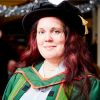
Ilse Astrid Ras
- Course: PhD English Language
- Graduation: 2017
- Nationality: Dutch
Please tell us a bit about yourself and your background.
I’m originally from the Netherlands, where I completed my BA. I have always been fascinated with language and text in and about crime. This originally meant that I wanted to study Law, but eventually drifted to studying English Language with a focus on (non-fiction) writing about crime.
What made you want to apply to your PhD course and to Leeds?
The School of English at the University of Leeds is so strong in both Literature and Language. Furthermore, I would have the opportunity to do my PhD under the supervision of Dr Christiana Gregoriou, whose exciting work on crime fiction I read as an undergraduate (and which made me realise I could actually study the stuff I found most interesting!).
What is it that makes you passionate about your area of study?
It’s so important to examine how we, as a society, write about behaviours, how we determine what’s within the range of ‘normal’ and what’s ‘deviant’. I’m particularly interested in how writing about deviant behaviours is different when the acts are committed by (financially) powerful people, compared to stereotypical criminals. I feel that by shining a light on the role of language in perpetuating these social disparities, I made at least a small contribution to eradicating these inequalities.
What aspects of the course did you enjoy the most?
I loved having the freedom to research many topics in philosophy, politics, economics and sociology that have bearing on how we write about and how we read writing about crime and deviant behaviour. My supervisors were fantastically supportive of me going out and doing as much of this exploration as possible, and they were also extremely good at helping me polish my writing, and helping me hone my argument, to pick out the bits in all this research that were most pertinent to my thesis. I enjoyed the process of becoming a better researcher.
Aside from the actual work of writing the thesis, I also really loved the community of the School of English. For a year, I volunteered as a co-chair for the Postgraduate Seminar, and this seminar was great to learn about the research other students in the School were doing. I’ve learned so much about Postcolonial research, for instance, just from the papers presented by my peers.
What has been the most surprising thing about coming to Leeds?
How quickly I adopted Yorkshire vowels! On a more serious note, I was most surprised by all the beautiful architecture and the friendly people. Abroad, even in a country as nearby as the Netherlands, we generally don’t really know much about the north of England, as news and tourism tend to focus on London and the Home Counties. So the North was a pleasant surprise just because I knew so little of it.
What would you say about the learning facilities in your School and at the University in general?
One of my favourite things was to sit in the Brotherton Library with a stack of books and just leaf through them to see if they were pertinent to my thesis. I should also mention the IT department, as they were always extremely quick to respond to any queries and really helped me out when my laptop died by saving the hard drive.
What other activities are available for students to take part in outside of their studies, and which ones have you tried out yourself?
As well as chairing the School of English Postgraduate Seminar for a year, I regularly attended cross-faculty postgraduate seminars. Furthermore, there were many voluntary teaching and mentoring related opportunities that were very popular with postgraduates, such as Rixa and Students as Scholars, both of which I also contributed to.
I also worked as a Sub Warden in halls for two years and had a great time doing it. As a Sub Warden, you get to contribute to ensuring all first years and some international students staying in halls have a comfortable and pleasant living space, which I found very rewarding.
What do you plan to do now you’ve finished your course, and how do you think the skills and knowledge you’ve developed at Leeds will help with these plans?
I’ve been applying for HE teaching and research positions in English Language. Obviously, having a PhD is the first and most important thing. Writing and verbal communication skills, developed through writing my thesis and participating in research seminars and conferences, are similarly extremely important because I’ll have to communicate my research and teaching materials to future colleagues and students. Doing this PhD also led me to pick up many administrative and IT skills, such as time management, teamwork, and how to use Excel effectively. These skills are useful in any job, of course, but also essential in being an academic.

